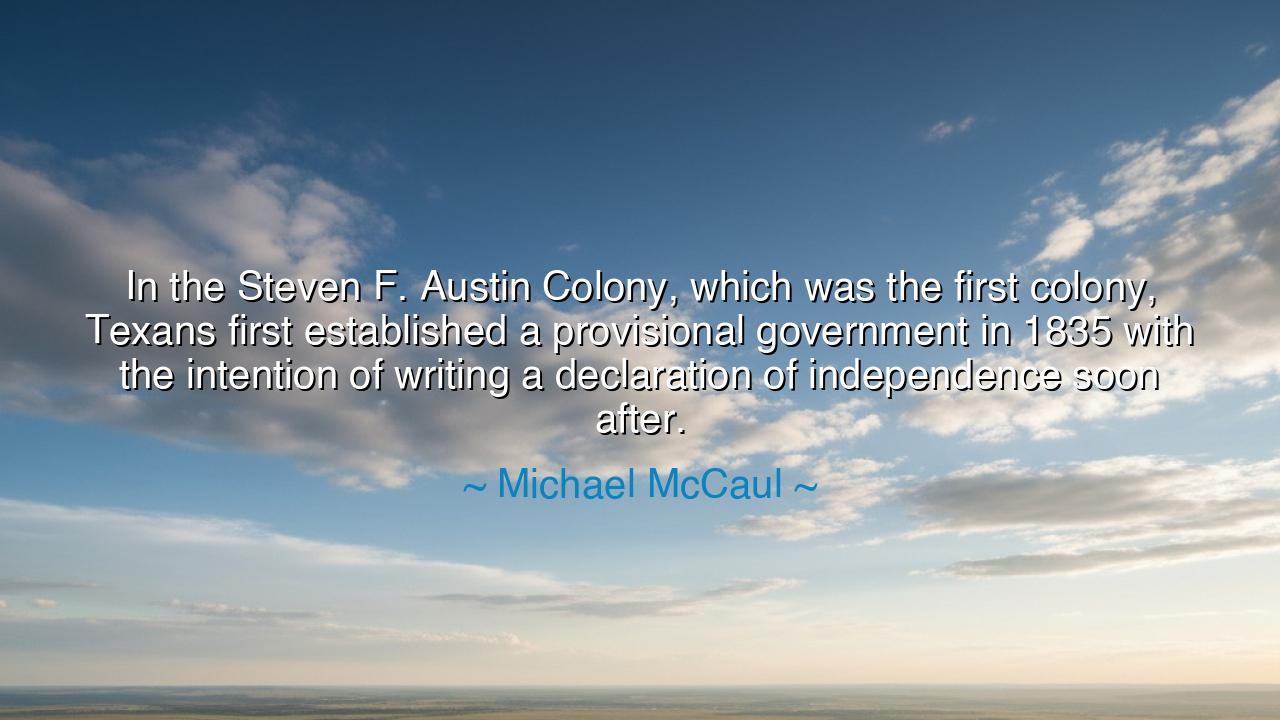
In the Steven F. Austin Colony, which was the first colony
In the Steven F. Austin Colony, which was the first colony, Texans first established a provisional government in 1835 with the intention of writing a declaration of independence soon after.






When Michael McCaul spoke the words, “In the Steven F. Austin Colony, which was the first colony, Texans first established a provisional government in 1835 with the intention of writing a declaration of independence soon after,” he was not simply recalling a chapter of history — he was invoking the birth of a spirit, the dawn of a people’s awakening. His words carry the weight of a truth as old as civilization itself: that freedom begins not with arms or banners, but with the quiet decision of a people to govern themselves. The year 1835, to which he refers, marks the moment when settlers in the Austin Colony — far from their native lands, facing danger, hardship, and uncertainty — resolved to take destiny into their own hands. It was there, in the wilderness of Texas, that the seed of independence first took root.
The origin of this quote lies in the story of Stephen F. Austin, known as the “Father of Texas,” who led families from the United States into the rich but untamed lands of Mexican Texas in the 1820s. These settlers, bound by courage and necessity, forged farms and homes from the wilderness. For years they lived under the rule of the Mexican government, loyal but uneasy, watching as central authority grew more oppressive. When liberty was threatened, and their voices silenced, they did what free men and women have always done — they gathered, they deliberated, and they built the foundations of their own governance. In 1835, the colonists met to form a provisional government, the first organized expression of Texan sovereignty. McCaul’s words recall this moment as the spark that would soon ignite the great flame of the Texas Revolution.
To understand the depth of this quote is to understand the universal rhythm of freedom — how all nations are born in struggle and sacrifice. Like the American Revolution before it, the movement in Texas began not with war, but with principle. The settlers of Austin’s colony did not seek rebellion for its own sake; they sought justice, fairness, and the right to shape their own laws. Yet when these hopes were denied, they turned toward independence — not as a reckless act, but as a sacred duty. Thus, in 1836, a year after the provisional government was formed, they wrote and signed the Texas Declaration of Independence, proclaiming their separation from Mexico. From that declaration sprang a new republic, built upon the same eternal longing that drives every people who refuse to be ruled without consent.
In every age, the birth of freedom is both heroic and painful. The settlers of the Austin Colony faced hunger, isolation, and war, but their courage endured. The battles of Gonzales, Goliad, and the Alamo were not mere military confrontations — they were the crucibles in which the Texan identity was forged. The cry of “Remember the Alamo!” echoed the ancient call of all who have fought against tyranny: that liberty, once awakened, can never again be chained. McCaul’s reminder of that provisional government is, in truth, a reminder of how greatness begins — not with wealth or weapons, but with conviction.
The ancients would have seen in this story the reflection of their own myths — the Athenians casting off the rule of kings, or the Romans driving out their oppressors to form a republic. For history repeats this truth: freedom is not granted; it is claimed. The Texans of 1835 were ordinary settlers — farmers, blacksmiths, teachers — yet they carried within them the divine spark of self-determination. It was not circumstance that made them free, but their will. The same fire that burned in the hearts of those early Texans burns in every people who yearn to stand upright, unbowed before the world.
But McCaul’s words also carry a warning wrapped in reverence. Independence, once earned, must be guarded. The spirit that formed in 1835 was not meant to fade into legend; it must be renewed with each generation. For complacency is the slow undoing of every republic. The people who once built a provisional government from nothing remind us that liberty, if neglected, withers like an untended field. Each age must write its own “declaration of independence” — not with ink and parchment, but with courage and integrity in the face of new forms of dependence, whether political, moral, or spiritual.
So, my children of the future, remember this: freedom is not a gift to inherit, but a covenant to uphold. As those first Texans did in the colony of Stephen F. Austin, you too must look at the world as it is and dare to imagine what it could be. Build your own provisional governments — in your hearts, in your communities, in your nations — wherever injustice reigns or apathy numbs. The path to independence will always be long and arduous, yet it is the only path worthy of humanity. For as McCaul reminds us through the memory of that first gathering in 1835, the dream of self-rule is not bound by time or place — it is the eternal song of the human spirit, rising again whenever men and women remember that they were born to be free.






AAdministratorAdministrator
Welcome, honored guests. Please leave a comment, we will respond soon